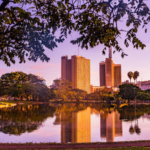The Ghana Must Go Saga

For many years, Nigeria and Ghana have had a complex relationship marked by brotherly rivalry, mutual admiration, and occasional tensions. This rivalry has been fueled by a range of factors, including Afrobeat wars, Jollof debates, and claims of cultural superiority. Despite these tensions, many Nigerians still find solace and a sense of calm in Ghana, a country known for its stunning beaches, warm hospitality, and rich cultural heritage. In many ways, Ghana is a haven where people can escape the noise and drama of places like Lagos, Nigeria, and enjoy the peace and tranquility of the Cape Coast. While many Nigerians find peace in Ghana’s tranquil environment, there was a time when Nigeria deported over two million illegal immigrants, leading to the infamous “Ghana Must Go” saga. This article explores the events that led up to this dramatic chapter in the history of these two West African countries.
What was it about Nigeria that drew so many immigrants?
Nigeria was considered the richest country in Sub-Saharan Africa in the 1970s. This was due to the discovery of oil in the country shortly before independence. High oil prices caused the 1970s oil boom, with Nigeria producing over 2.3 million daily barrels. Ghana, on the other hand, was going through a difficult period. Prior to this, Ghana was a country once regarded as the world’s largest cocoa producer. Still, due to a drop in cocoa prices, the country was experiencing severe economic hardship, with some describing it as a period of famine and hunger in the land. In addition, a military coup around this time harmed people’s trust in the country after Flt. Lt. Jerry Rawlings seized power in Accra in 1979. This made hundreds of thousands of Ghanaians flee to Nigeria for political and economic reasons.
There was also the ECOWAS Protocol on the Free Movement of Persons, signed in May 1979. This protocol eliminated visa requirements for nationals of member countries who wanted to visit other countries for 90 days. Although many foreigners had been coming to Nigeria since the early 1970s oil boom, thousands of foreigners, mostly from the ECOWAS states of Chad, Niger, Benin etc. flocked into the country after the ratification of this protocol. Because of the corruption and inefficiency of Nigerian immigration officials, most of those who arrived after the middle of 1979 did not have valid documents.
Also, they did not have work permits, as required by Nigerian law. Despite this, most of them worked in various sectors of the economy. These ranged from professional jobs such as teachers, nurses, and architects to carpentry and bricklaying in construction companies. Many worked in small-scale industries such as baking and poultry farming, while some worked as housekeepers or in the hotel industry. However, many of the immigrants lacked jobs, although they managed to earn a living and even remit funds to their families back home.
What were the grounds for deportation?
Unfortunately, oil prices did not remain high forever. By the 1980s, major countries such as the United States and Canada had entered a recession and could not meet the high demand for oil. Also, these countries began producing their oil and were no longer completely reliant on global markets. Nigeria’s economy is based on oil rents for 90% of its revenue. The drop in oil prices devastated the economy, and Nigeria gradually began to slide into a serious economic crisis. Food prices skyrocketed, and the government could not meet demand or pay employees. It didn’t take long for the immigrants, the majority of whom were Ghanaians, to be blamed. In the media, terms like “aliens” and “illegal immigrants” began to appear. They blamed the aliens for the high crime rate and for stealing the jobs of Nigerians.
The Federal Government of Nigeria announced the deportation of all illegal immigrants. This came after much tension and worsening economic conditions. The Minister of Internal Affairs, Alhaji Ali Baba, issued an announcement on January 17. He gave an estimated 2 to 3 million illegal immigrants a 14-day ultimatum to leave the country. Also, he urged private employers to ensure the departure of illegal immigrants from their various establishments, stating that government agents would begin inspecting commercial, industrial, and household establishments on January 31, 1983. The aim was to flush out of the country “the defaulting aliens.”
The Journey Back Home
The Ghanaians had two weeks to leave the country, forcing them to quickly pack their belongings in bags. This led to the popularization of the term “Ghana Must Go” which is still in use today. However, their return to Ghana was fraught with difficulty as a military coup led by Jerry Rawlings overthrew the government and closed the borders and seaports. This created a problem for the Ghanaians who could not enter their country even though they had been given a two-week notice to leave Nigeria.
Reports emerged of sufferings, hardships, and some deaths among the immigrants waiting to leave Nigeria. The wait was for the Ghana National Shipping Line (the Black Star Line), and the borders of Benin, Togo, and Ghana to be open. Despite this, there were no reports of harassment by Nigerians, the Nigerian police, or army. Moreover, there were no reports of robberies, extortions, or seizures of property from foreigners. Many Nigerians sympathized with the aommigrants, and the Nigerian Transport Owners’ Association provided 200 trailers to transport the stranded illegal immigrants to Ghana for free. The trailers conveyed about 20,000 individuals.
However, there were reports that some Nigerian food vendors raised their prices for the immigrants while they waited for days to leave the country. Additionally, in some cases, the Ghanaians had to sell some of their previously acquired movable property in Nigeria, such as radios and televisions, to pay for food. Also, due to the large number of immigrants who had to assemble in a few open centers for more than seven days, sanitation and health issues deteriorated.
Reactions
Members of the international community expressed outrage over Shehu Shagari’s deportation of aliens to their home country. The State Department in Washington called the decision “shocking” and said it violated “every imaginable human right.” The Pope, John Paul II, condemned the departure as a grave, incredible drama. He described it as the century’s largest single and “worst human exodus” of the century. Additionally, Mr. Michael Foot, the British House of Commons then-Opposition Leader, wrote to Nigeria’s High Commissioner in London, Alhaji Shehu Awak. He called the expulsion order and its implementation “an act of heartlessness and a failure of common humanity.”
The Daily Mail (London) condemned President Shehu Shagari for “defying world opinion despite alarming television pictures of misery, destruction, and deaths among the fleeing aliens.”. The Nigerian government was using illegal immigrants as scapegoats for its political and socioeconomic failures, according to the claim. It went on to say that “xenophobia in Nigeria, which is never in short supply, may be building up to a field day.”
In the midst of all of this, some see Nigeria’s expulsion of aliens, the majority of whom were Ghanaians, as retaliation for the expulsion of aliens meted out by Ghana under Prime Minister Kofi Busia in 1969. Over 2.5 million people, mostly of Nigerian origin, were expelled during that time. Some saw this as contradicting Kwame Nkrumah’s view of pan-Africanism. However, Nigeria’s decision contradicted the “big brother” role she assumed as Africa’s giant. Also, the free trade and movement agreement signed into law by ECOWAS, was not honored in this case.
The phrase “Ghana Must Go” has stuck. Many people are unaware of the origins, but the countries’ silent rivalry persists. There are still Ghanaian communities in Nigeria, and many Nigerians continue to trade in Ghana. They have faced some difficulties, but it is too early to predict whether “Nigeria must go” comes anytime soon. The bag’s name, however, is still associated with the deportation event to this day.












